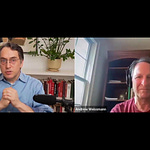Judge Boasberg today found that the government was in contempt of his order not to remove people to El Salvador—and to bring them back if they were not yet there. I discuss what it means to be in civil vs. criminal contempt (an issue I’ve dealt with in my career), and what’s next: how the court can enforce his findings by imposing civil penalties or even seeking to prosecute those involved.
Stay engaged.
–Andrew
P.S. For the video on YouTube, click here.
TRANSCRIPT
Hi, I wanted to do a quick Substack video explaining criminal contempt and civil contempt. Why not? Just because we’re dealing with this in the Garcia case, where you have a judge—a federal judge in Maryland—dealing with the issue of whether there’s been contempt of her order, trying to find out exactly what is going on with respect to Mr. Garcia.
But also because Judge Boasberg, who had the case involving two plane loads of individuals sent to El Salvador, has just issued today a ruling finding that there was probable cause—there is probable cause, according to him—that there was contempt of his order. His written order said that you are not to remove these people, and if they are in the air, you are to bring them back. He lays out all of the facts about why he thinks there was contempt of his order, and that the government was basically just rushing to get them to El Salvador—a place where we know from the Garcia case, the government is saying, “Hey, once they’re there, we can’t control them. We have no control whatsoever over this sovereign nation.” That’s a factual claim that is highly, highly dubious, and that the Maryland judge is going to get to the bottom of.
So that’s one sort of lawless action that judge is dealing with. The one that Judge Boasberg just found by probable cause is that there was contempt of his written order—contempt of a judicial order. And I wanted to discuss civil contempt, which he has said that he has found, and then also criminal contempt.
What’s the difference? I’ve actually dealt with both of these a lot earlier in my career, when I used to do organized crime work as a prosecutor in New York. At various times, mobsters would be in civil contempt and/or criminal contempt.
So what is the difference?
Civil contempt is the act of disobeying a court order. Note for a second that this also can be the basis for criminal contempt. But civil contempt can constitute deliberately disobeying a court order, and what the judge is doing in sanctioning that—figuring out what’s the remedy—is trying to take coercive remedies that get the person, the contemnor, to comply with the order.
A typical way that could happen is fines. You could say, “You are fined each day $1,000 or $10,000.” The judge I clerked for once said, “You know what, every day the amount is going to double.” So that very quickly becomes quite a lot of money as a way of coercion. That is the whole point of civil contempt—to coerce the person, not punish the person.
Remember, the way it works under the law is the person has the keys to their jail cell or the keys to getting out of contempt, because they can simply comply.
That’s one remedy—fines. But also—and this may sound like an oxymoron—civil contempt can include jailing a person. So if you think that a fine won’t work, you can also send the person to jail until such time as they comply with a judicial order. Again, the person has the keys to their jail cell, because they can just raise their hand and say, “Judge, I’m willing to now comply with your order,” in which case they’ll be released.
It is entirely a mechanism to coerce the person to do what they’ve been ordered to do. You are not allowed, as a court, to use that sanction if—after a certain period of time—it becomes clear that there’s no coercive effect to either jail or a fine. But we’re not at that point.
So what is criminal contempt?
Criminal contempt can actually be based on the exact same facts—which is, you’re disobeying a court order—but rather than the penalty just being to coerce you to comply, you can actually be punished.
Here’s an example: Steve Bannon.
Steve Bannon had been accused of—and ultimately convicted of—refusing to comply with a congressional subpoena. He was both in civil contempt of that, but he also then was criminally charged and actually criminally convicted. But shortly before his criminal case, he told the judge, “Hey, I’m willing to comply with the order.” Well, that’s fine. That deals with the civil contempt part. But that’s irrelevant to the criminal contempt part. Meaning: if you’ve already deliberately violated the court order, whether you comply eventually or not doesn’t matter in terms of the punishment—the criminal punishment—for having violated that court order.
So that is criminal contempt, and it is completely independent and separate from civil contempt.
Very often, though—and you see this with Judge Boasberg—he has said that if the government complies with his order, he will not go further and seek criminal contempt as to the specific individuals that he’s going to ferret out who were in violation of his order. So he’s sort of holding that as his Sword of Damocles over their head—saying that, “If you comply with my order civilly, then I won’t need to get to the second part, which is criminal contempt.” As a matter of discretion, he doesn’t need to do that. And he cites in law that that is the proper way to proceed in this circumstance.
But if the government doesn’t comply with this order, then he is proceeding with the criminal side.
One of the things he says is that he gives the Department of Justice an opportunity to say whether they would prosecute this. Most people listening to this will go, “Well, that’s never happening,” because Pam Bondi is never going to say that she’s doing that.
But there’s a remedy—because in connection with contempt, which is contempt of a judicial order, there is legal authority that the court, if it provides DOJ an opportunity to prosecute it and they say no, the court can actually appoint a prosecutor. And that prosecutor will act independently of the court and can go forward in prosecuting this matter.
That actually happened in a case here in New York that was presided over by Judge Kaplan, where he found someone to be in criminal contempt. He appointed a prosecutor, and that case was prosecuted before a separate judge, and the person was actually convicted of criminal contempt.
Finally, some people have asked about whether the President can pardon his way out of this.
I think it is highly unlikely that a pardon would ever apply to civil contempt. That’s a civil remedy, and it’s there for the court to basically coerce someone to get them to comply with a court order. A pardon is for a criminal violation—not a civil violation.
Remember, civil contempt can include a fine; it can include jail. Those are all tools in Judge Boasberg’s arsenal.
Big picture: you now have a federal judge having found that there was—in fact—the Department of Justice deliberately violating his order. He has found that by probable cause, and now he is dealing with what the sanction would be.
Remarkably, in a very similar context in Maryland, you have a judge looking at the exact same issue. So from a big picture perspective, when people are talking about the rule of law and whether this administration would adhere to judicial rulings and orders—you now have one judge saying, “I find by the standard of probable cause—that’s the relevant standard here—that in fact, that has happened.”
So when I—and many others—have said, “We’re here. We are at the constitutional crisis,” that is exactly what Judge Boasberg is finding today in his ruling in connection with two plane loads of people who are now sitting in prison in El Salvador, where the Supreme Court has ruled—in a case where there was unanimity, no dissent—that all of those people were entitled to a hearing before they were removed from this country. And they did not get that hearing.
What’s remarkable is that there was a way for the government to do this entirely legally: give them that hearing. If they thought they had the proof and the law allowed for removal, they could argue that to the judge—and the judge could have done it. Instead, they did this unilaterally, and—to the point of Judge Boasberg’s decision today—they did it not just unilaterally, but in disregard of a judicial order telling them not to.
Stay tuned. Stay engaged. More to come.











